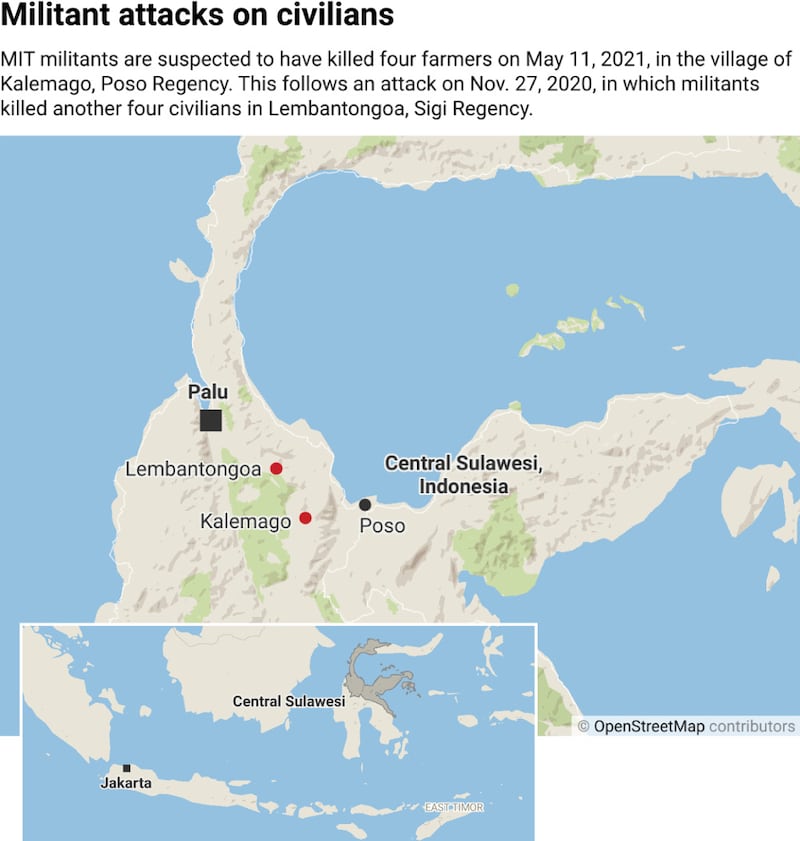Villagers are urging Indonesia’s leader to visit the restive Poso region in Central Sulawesi province as a sign of his commitment to resolving security problems there after pro-Islamic State militants killed four farmers in the latest violence there last week.
More than a dozen people representing residents of Lore Bersaudara, a district of Poso regency, submitted an open letter to President Joko “Jokowi” Widodo on Monday through the local legislative council.
Their letter expressed frustration at the authorities’ failure to root out the Eastern Indonesia Mujahideen (MIT), a pro-Islamic State militant group which government officials have blamed for two large deadly attacks in a six-month span, but which is said to number less than a dozen fighters.
“For 22 years the people of Poso have endured dark times because of the lack of security and inadequate protection from the state for the people of Poso,” the villagers said in the letter, a copy of which BenarNews obtained.
“We respectfully call on the honorable President of the Republic of Indonesia to immediately resolve the security problems in Poso thoroughly,” the letter said.
Muslim-Christian violence in Poso erupted in 1999, leaving thousands dead from both communities. The sectarian fighting ended with the signing of a peace accord in 2001, but sporadic violence has rocked the region after MIT emerged in 2010.
The letter also demanded that the government provide compensation and economic support for Poso residents who have been unable work because of security threats.
Poso Council Speaker Sesi K.D. Mapeda promised to relay the villagers’ demands to the central government.
The letter follows a May 11 attack when suspected MIT militants killed four farmers in Poso’s Kalemago village – the first presumed attack by the group targeting civilians in more than five months, police said. One of the victims was decapitated.
“What happened to our brothers in Kalemago village recently is a tragedy for all Poso residents,” Sesi told reporters.
On Tuesday, the Witness and Victim Protection Agency (LPSK) gave 15 million rupiah (U.S. $1,000) to survivors of the farmers – identified as Paulus Papa, Luka Lese Puyu, Simon Susah and Marten Solong.
LPSK deputy chairman Edwin Partogi Pasaribu said the agency was ready to provide protection at the request of victims and witnesses.
Previously, MIT members allegedly killed four villagers in a Christian community in nearby Sigi regency on Nov. 28, 2020.
That attack was the deadliest one against civilians mounted by MIT fighters to date.
Jokowi did not visit Central Sulawesi after the November attack but condemned it soon after as an “inhuman and uncivilized act,” as he called on authorities to wipe out those militants once and for all.

Poso has long been a hotbed of MIT activity – a group now reduced to nine fighters, according to Indonesian officials who have mounted joint military and police manhunts over the past several years to wipe out the group.
In its latest effort to elude police, MIT has split into two groups, authorities said. Police and the military launched an operation codenamed Madago Raya to take down the militants, Central Sulawesi police spokesman Didik Supranoto said.
One group led by Ali Kalora is active in Sigi regency, while the other under the leadership of a militant named Qatar operates in Poso, Didik said.
“This is based on witness reports and facts gathered by investigators on the ground,” Didik told reporters, adding that authorities did not know what weapons were in MIT’s arsenal.
“We cannot clearly specify the weapons and ammunition owned by the two groups. What is certain is that they are still armed,” Didik said.
He called on locals to remain calm and go about their activities as usual, saying task-force members would provide security.
“And when members the public see any suspicious person, they must immediately report to the authorities. The TNI and police are committed to providing security to the community,” Didik said using an abbreviation for the armed forces.
Meanwhile, Mohammad Mahfud MD, Indonesia’s coordinating minister for political, legal and security affairs, condemned the recent killings and vowed to crush MIT.
“The government is determined to eliminate these terrorists, to completely eradicate the acts of violence carried out by terrorist groups, both in Papua and the Eastern Indonesia Mujahideen terrorists in Poso,” Mahfud MD told reporters on Wednesday, referring as well to separatist insurgents in the far-eastern Papua region.
He said MIT was increasingly “under siege,” without providing details.
Didik said provincial police had formed three teams consisting of Madago Raya task-force members to hunt down the MIT militants who have pledged allegiance to the Islamic State (IS) group.
One team is tasked with pursuing the MIT members in their jungle hideouts while a second team is to focus on preventing their escape in border areas. The third team is deployed in villages to provide security.
“We hope that with this strategy, we can successfully capture MIT,” Didik said.
Desperate
MIT has survived in the mountains and jungles of Poso despite being hunted by police and military forces since 2015.
It is one of two pro-IS groups operating in Indonesia, the world’s most populous Muslim-majority country. The other is Jemaah Ansharut Daulah (JAD), which authorities have blamed for most terror attacks in the archipelago nation during the past five years.
MIT militants may have resorted to killing out of desperation as supplies were drying up or to show that they still exist, said Sidney Jones, director of the Jakarta-based Institute for Policy Analysis of Conflict (IPAC).
“They may have tried to get supplies including food,” she said.
Jones said MIT militants had eluded capture because security forces were not adequately trained for jungle operations.
“They can move from one place to another without getting caught,” she said.
Tria Dianti contributed to this report from Jakarta.
